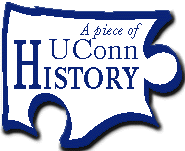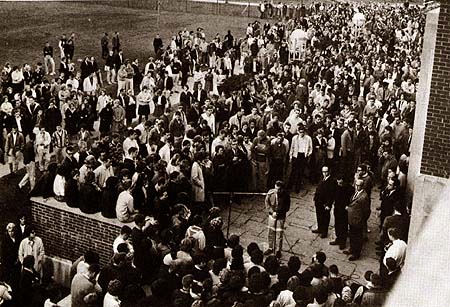|
This is an archived article.
For the latest news, go to the
Advance Homepage For more archives, go to the Advance Archive/Search Page. | ||||
|
Past National Tragedies Stirred
Shocked Emotions, Patriotic Words
More than a week after the attack on Pearl Harbor half a world away, the Connecticut Campus, UConn's student newspaper, published weekly at that time, noted in an editorial how quietly the University had reacted. America in 1941 was already on a war footing, anticipating its entry into what was a two-year old war in Europe. Local air-raid wardens had been trained two months before the attack on Pearl Harbor. Radio reported the attack, but there were no live broadcasts from the scene, and certainly no television sets on which to view images of the destruction and loss of life. "The calm manner in which the campus took the exciting news of last week can be contrasted sharply with the mass meetings, parades, effigy-burning, and declarations of war by students on other campuses throughout the country," reported the Campus. "We may reflect on the more thoughtful attitude of the Connecticut students, the quiet efficient way the air-raid wardens went about their jobs of preparing for a vaguely possible air raid, the calmness of most of the faculty, and the solid words of Dr. Jorgensen: 'Normal functions must go on ... the best way to be patriotic is to do your job and do it well.' Jorgensen's words came on Monday, Dec. 8, at the annual alumni-varsity banquet that closed out the football season. There were certainly personal and private reactions to the bombing in Hawaii, but the Connecticut Campus, in its last two issues of the semester, Dec. 10 and 17, made no note of any special community gatherings or displays. The Campus did report, however, that there was a large crowd at the annual Christmas vespers service at the Storrs Congregational Church on Sunday, Dec. 14. The following Thursday, Dec. 18, a half hour of the University choir's Christmas concert was broadcast to "war-torn Europe" via a short-wave radio station in Boston.
That Friday in November On Nov. 22, 1963, radio and television broadcasts meant the nation heard and saw the events in Dallas only a short time after they happened.
In an interview last year for an article about WHUS, Winston Heimer, Class of 1965 recalled what happened that Friday in November 1963: "I had just left the station for a 1 o'clock class when the bulletin cleared the wire. We put a monitor in the window and the broadcast was heard by people standing on the Student Union terrace. "It was a dark weekend," Heimer said. It was dark because Kennedy had been such a youthful presence in the lives of many, particularly college students and other young people. And his death was like a death in one's own family. More than 1,500 in the University community attended a memorial service in Jorgensen Auditorium on Monday, Nov. 25, coinciding with similar services across the nation on the day that Kennedy was buried at Arlington National Cemetery. Speaking on behalf of the University, Provost Albert Waugh, reported the Campus, made points "which seem designed to give courage to the living." With a quotation from the Bible and an allusion to Julius Caesar, Waugh said the emotions of despair, anger, and grief were inappropriate. "'Despair is no compliment to him as a man,' Waugh said. 'If he has done his job well than the state will proceed as before and there is nothing to despair about. "'Although anger is a natural reaction,' said Waugh, 'he that is slow to anger is better than the mighty.' "Waugh said those who turn to grief at such a time do not grieve for the dead, but for themselves instead. "He said there was no cause to display any of these feelings because, as Caesar said, 'that death which comes unexpectedly is the best death'." In a special four-page edition published on Saturday, Nov. 24, 1963, the Connecticut Daily Campus reported on the scene in the Student Union Lobby the day before: "The shock grew and so did the crowd. They were more hopeful and at the same time more fearful. Rumor said he was dying. Everyone took another glimpse at the AP or UPI wire services and waited and prayed ... Then the television announcer said, 'President Kennedy is dead.' "It took a while until the meaning of the words were felt. Then they wept." Mark J. Roy |


